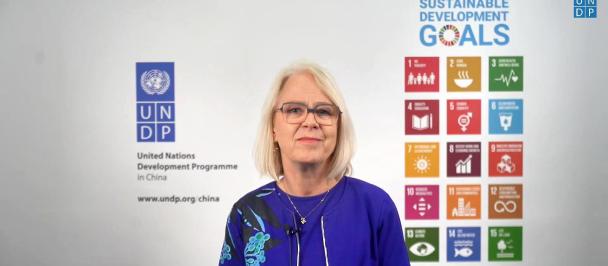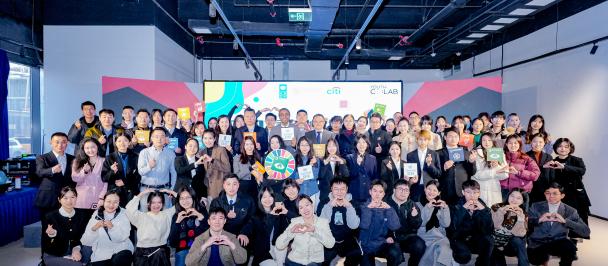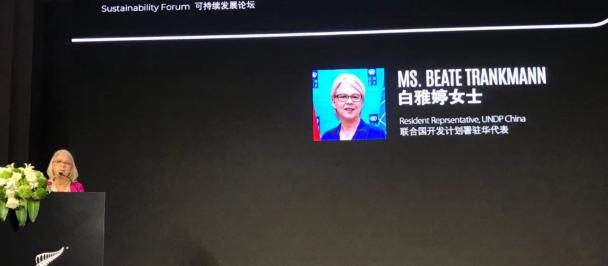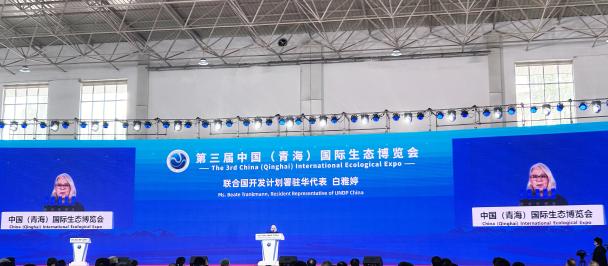UNDP cohosts Capacity Building and Knowledge Sharing Workshop on Low Carbon Transition and Green & Sustainable Finance
April 12, 2023
UNDP Resident Representative in China Beate Trankmann speaks during the event's opening ceremony in Quanzhou, China.
12 April, Quanzhou – A capacity building and knowledge sharing workshop discussing best practices and insights on the low-carbon transition and green & sustainable finance concluded today in Quanzhou, China.
The workshop was jointly organized by the United Nations Development Programme in China, the International Cooperation Centre (ICC) of the National Development and Reform Commission (NDRC), and the China Development Bank’s Innovation and Development Center for the Belt and Road Initiative, with expert support from the World Resource Institute (WRI) and funding support from the Tanoto Foundation.
Through both online and offline channels, the event saw a diverse range of domestic and international experts provide lectures, share experiences, and contribute to thought-provoking discussions, complemented by site visits. Workshop participants included government officials from both the local and national levels including from NDRC, China’s Ministry of Commerce (MOFCOM), and Ministry of Foreign Affairs (MOFA), as well as representatives from the financial sector such as the China Development Bank (CDB).
“We can accelerate the green and just transition for a better future by equipping policymakers and stakeholders with the knowledge, tools, and resources necessary to drive this transformation,” said Beate Trankmann, UNDP Resident Representative in China in her opening remarks.
This workshop is a result of a partnership between UNDP, NDRC, and CDB formalized last year, to leverage the Center to help advance progress on the 17 Sustainable Development Goals (SDGs) and address the challenges of climate change both in China and beyond. One of the priority areas of the Center includes demand-based global-level training and capacity building on low-carbon development and SDG-conducive financing and investments. This workshop is the first in a series of events and knowledge products under this partnership.
“The workshop was organized against the backdrop of advancing the implementation of China’s carbon peaking and carbon neutrality goals,” said Jian Gao, Deputy Director General of Department of International Cooperation, NDRC. “We hope all participants can successfully complete all courses, engage in mutual exchanges, and apply the knowledge to develop innovative works to promote [China’s] dual carbon goals.”
Throughout the three-day program, participants delved into a range of topics, including policy innovation to accelerate the low-carbon and clean energy transition, integrating the SDGs into low-carbon development, designing and implementing effective emission reduction pathways, and ensuring a just transition. The workshop also examined the latest green finance policies and sustainable finance standards, both domestically and internationally.
“We hope to take this capacity building workshop as an opportunity to contribute to promoting the harmonization of rules and practices in the field of green development in China and abroad,” said Xianchun Gao, Deputy Managing Director of Research and Planning Department, CDB.
Participants also exchanged perspectives on local-level development priorities for green and sustainable development, as well as the incorporation of sustainable development into local planning and financing frameworks.
In addition, a site visit to Jin Jiang Power Storage Plant was organized, where participants had the opportunity to witness low-carbon transition practices in action and learned about trends for low-carbon transition.
The workshop provided a platform for fostering two-way exchanges and mutual learning for national and local level policymakers in China, while also offering international best practices and knowledge tools to accelerate policy development and implementation of the low-carbon transition towards achievement of the 2030 Agenda for Sustainable Development, and the Paris Climate Agreement.

 Locations
Locations



